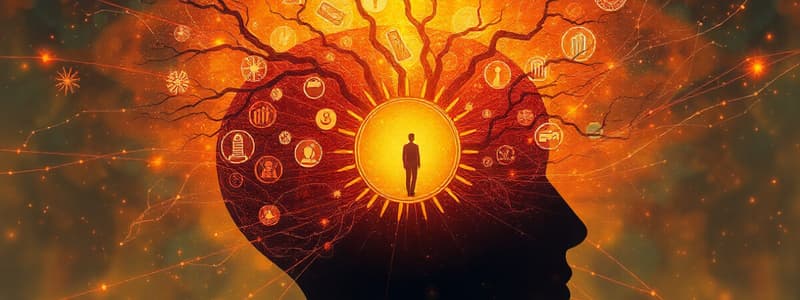Podcast
Questions and Answers
What is the term for the activation of nodes in memory without conscious awareness?
What is the term for the activation of nodes in memory without conscious awareness?
- State-dependent Memory
- Cued Recall
- Priming (correct)
- Context
What effect describes the tendency to remember the first and last items on a list better than those in the middle?
What effect describes the tendency to remember the first and last items on a list better than those in the middle?
- Serial Position Curve (correct)
- Contextual Recall
- Primacy Effect
- Recency Effect
Which type of recall provides the most retrieval cues and tends to yield the best results?
Which type of recall provides the most retrieval cues and tends to yield the best results?
- Contextual Recall
- Recognition (correct)
- Cued Recall
- Free Recall
What does state-dependent memory refer to?
What does state-dependent memory refer to?
What is a common error where the source of a memory is incorrectly attributed?
What is a common error where the source of a memory is incorrectly attributed?
What type of information might lead to inaccurate recollections of an event?
What type of information might lead to inaccurate recollections of an event?
Which term best describes a mental blueprint containing common aspects of the world?
Which term best describes a mental blueprint containing common aspects of the world?
What effect is observed when misleading information impacts a person's recollection of an event?
What effect is observed when misleading information impacts a person's recollection of an event?
What are the highly vivid memories called?
What are the highly vivid memories called?
What process describes the strengthening of connections between neurons to store memories?
What process describes the strengthening of connections between neurons to store memories?
Which researcher was the first to investigate memory decay?
Which researcher was the first to investigate memory decay?
What term describes the situation when old information is impaired by new learning?
What term describes the situation when old information is impaired by new learning?
What type of memory remains stable with aging?
What type of memory remains stable with aging?
Which ability is known to improve around age 60 in older adults?
Which ability is known to improve around age 60 in older adults?
What is the term used when a memory retrieval is difficult but not completely lost?
What is the term used when a memory retrieval is difficult but not completely lost?
Which cognitive ability is expected to decline with aging?
Which cognitive ability is expected to decline with aging?
What is the concept of mental age developed by Binet?
What is the concept of mental age developed by Binet?
Which perspective emphasizes that language is an innate biological mechanism?
Which perspective emphasizes that language is an innate biological mechanism?
Vygotsky believed that language and thought are:
Vygotsky believed that language and thought are:
What does the strong version of the Sapir-Whorf hypothesis assert?
What does the strong version of the Sapir-Whorf hypothesis assert?
What is a language acquisition device (LAD)?
What is a language acquisition device (LAD)?
Which theory suggests that environmental cues and biology interact in language acquisition?
Which theory suggests that environmental cues and biology interact in language acquisition?
What does the critical period in language acquisition refer to?
What does the critical period in language acquisition refer to?
Which statement aligns with the Universalism theory in the context of language?
Which statement aligns with the Universalism theory in the context of language?
What is overconfidence when it comes to test preparation?
What is overconfidence when it comes to test preparation?
Which of the following describes belief perseverance?
Which of the following describes belief perseverance?
What defines confirmation bias?
What defines confirmation bias?
What is the main characteristic of the formal operational stage in cognitive development?
What is the main characteristic of the formal operational stage in cognitive development?
How does framing affect decision-making?
How does framing affect decision-making?
What characterizes typical semantic networks in the mind?
What characterizes typical semantic networks in the mind?
Which problem-solving method is described as a logical procedure for finding a solution?
Which problem-solving method is described as a logical procedure for finding a solution?
What is the purpose of means-end analysis in problem-solving?
What is the purpose of means-end analysis in problem-solving?
What does the g factor represent in intelligence theory?
What does the g factor represent in intelligence theory?
Which model suggests that semantic networks develop based on individual experience?
Which model suggests that semantic networks develop based on individual experience?
Which type of intelligence is primarily measured by IQ tests?
Which type of intelligence is primarily measured by IQ tests?
Which decision-making heuristic involves making judgments based on the availability of specific examples in memory?
Which decision-making heuristic involves making judgments based on the availability of specific examples in memory?
What is considered an element of intelligence as defined by the content?
What is considered an element of intelligence as defined by the content?
What does the theory of '1 general intelligence' imply?
What does the theory of '1 general intelligence' imply?
What distinguishes fluid intelligence from crystallized intelligence?
What distinguishes fluid intelligence from crystallized intelligence?
What does the conjunction fallacy imply about judgment in decision-making?
What does the conjunction fallacy imply about judgment in decision-making?
Which statement best characterizes a fixed mindset regarding intelligence?
Which statement best characterizes a fixed mindset regarding intelligence?
Which method is identified as relying on instinct and has a high chance of error in problem-solving?
Which method is identified as relying on instinct and has a high chance of error in problem-solving?
What type of intelligence can be defined as the ability to generate novel ideas?
What type of intelligence can be defined as the ability to generate novel ideas?
What occurs in problem-solving when someone gets fixated on a wrong approach?
What occurs in problem-solving when someone gets fixated on a wrong approach?
In decision-making, what does the representativeness heuristic focus on?
In decision-making, what does the representativeness heuristic focus on?
In studies of heritability, what is indicated by the strongest correlation among twins?
In studies of heritability, what is indicated by the strongest correlation among twins?
Which theory differentiates intelligence into eight modalities?
Which theory differentiates intelligence into eight modalities?
How does fluid intelligence typically change with age?
How does fluid intelligence typically change with age?
Flashcards
Empathy
Empathy
The ability to understand and share the feelings of another.
Formal Operational Stage
Formal Operational Stage
A stage of cognitive development where individuals can reason abstractly, think hypothetically, and consider consequences.
Algorithm
Algorithm
A problem-solving method that involves systematically trying out solutions until the correct one is found.
Heuristics
Heuristics
Signup and view all the flashcards
Means-End Analysis
Means-End Analysis
Signup and view all the flashcards
Availability Heuristic
Availability Heuristic
Signup and view all the flashcards
Representativeness Heuristic
Representativeness Heuristic
Signup and view all the flashcards
Conjunction Fallacy
Conjunction Fallacy
Signup and view all the flashcards
Overconfidence
Overconfidence
Signup and view all the flashcards
Belief Perseverance
Belief Perseverance
Signup and view all the flashcards
Confirmation Bias
Confirmation Bias
Signup and view all the flashcards
Framing Effects
Framing Effects
Signup and view all the flashcards
Semantic Networks
Semantic Networks
Signup and view all the flashcards
Spreading Activation
Spreading Activation
Signup and view all the flashcards
Intelligence (IQ)
Intelligence (IQ)
Signup and view all the flashcards
General Intelligence
General Intelligence
Signup and view all the flashcards
Long-Term Potentiation (LTP)
Long-Term Potentiation (LTP)
Signup and view all the flashcards
Mental Age (Binet)
Mental Age (Binet)
Signup and view all the flashcards
Synaptic Plasticity
Synaptic Plasticity
Signup and view all the flashcards
Behavioral Theory of Language
Behavioral Theory of Language
Signup and view all the flashcards
Decay
Decay
Signup and view all the flashcards
Nativist Theory of Language
Nativist Theory of Language
Signup and view all the flashcards
Interactionist Theory of Language
Interactionist Theory of Language
Signup and view all the flashcards
Relearning
Relearning
Signup and view all the flashcards
Retroactive Interference
Retroactive Interference
Signup and view all the flashcards
Language Acquisition Device (LAD)
Language Acquisition Device (LAD)
Signup and view all the flashcards
Proactive Interference
Proactive Interference
Signup and view all the flashcards
Linguistic Relativity (Sapir-Whorf Hypothesis)
Linguistic Relativity (Sapir-Whorf Hypothesis)
Signup and view all the flashcards
Episodic Memories
Episodic Memories
Signup and view all the flashcards
Critical Period for Language Acquisition
Critical Period for Language Acquisition
Signup and view all the flashcards
Semantic Memories
Semantic Memories
Signup and view all the flashcards
Vygotsky's Theory of Language and Thought
Vygotsky's Theory of Language and Thought
Signup and view all the flashcards
Priming
Priming
Signup and view all the flashcards
Context
Context
Signup and view all the flashcards
State-dependent Memory
State-dependent Memory
Signup and view all the flashcards
Cued Recall
Cued Recall
Signup and view all the flashcards
Recognition
Recognition
Signup and view all the flashcards
Memory Reconstruction
Memory Reconstruction
Signup and view all the flashcards
Source Monitoring Error
Source Monitoring Error
Signup and view all the flashcards
False Information
False Information
Signup and view all the flashcards
What is 'g factor'?
What is 'g factor'?
Signup and view all the flashcards
What is Analytical Intelligence?
What is Analytical Intelligence?
Signup and view all the flashcards
What is Creative Intelligence?
What is Creative Intelligence?
Signup and view all the flashcards
What is Practical Intelligence?
What is Practical Intelligence?
Signup and view all the flashcards
What is Emotional Intelligence?
What is Emotional Intelligence?
Signup and view all the flashcards
What is Fluid Intelligence?
What is Fluid Intelligence?
Signup and view all the flashcards
What is Crystallized Intelligence?
What is Crystallized Intelligence?
Signup and view all the flashcards
What is a Fixed Mindset?
What is a Fixed Mindset?
Signup and view all the flashcards
Study Notes
Retrieval Cues
-
Priming involves prior activation of nodes/associations, often subconsciously.
-
Context refers to the environment during encoding and retrieval. Scuba divers performed better recalling information in the same location where they learned it.
-
State-dependent memory: Learning in a particular state (e.g., drunk) increases recall in the same state. Mood and context also impact recall.
-
Retrieval cues include free recall, cued recall, and recognition.
-
Free recall: Recalling information without cues.
-
Cued recall: Retrieval cues assist recall.
-
Recognition: Identifying presented information. Cued recall often leads to better performance than free recall.
-
Recognition is the best method, followed by cued recall, and finally free recall.
Memory Reconstruction
- Memories are not stored as exact copies.
- Every retrieval changes the memory, influenced by goals, mood, and environment.
- Schemas (mental frameworks) are used to fill in missing details, potentially distorting accuracy.
False Memories
- False memories are inaccurate recollections of an event.
- Misleading information can affect memory: Participants asked about car crashes using different descriptive terms gave different descriptions of how fast the cars were going.
Source Monitoring and Emotional Memories
- Source monitoring refers to remembering the source of information.
- Emotional memories are highly vivid, but can still be subject to reconstruction.
Long-Term Potentiation and Synaptic Plasticity
- Long-term memories involve strengthening neuronal connections (synapses).
- Repeated stimulation strengthens synapses, leading to long-term potentiation.
Decay and Interference
- Decay: Memories weaken over time if not retrieved.
- Interference: New learning can impair recall of old information (retroactive interference), or previously learned material can interfere with new learning (proactive interference).
- Memories are much more likely to be remembered if they are frequently retrieved.
Aging and Cognitive Abilities
- Implicit memory (e.g., riding a bike) remains stable with age, though some improvement in memory occurs with age.
- Semantic memory (vocabulary) generally improves up to age 60.
- Crystallized intelligence (stored knowledge) tends to increase or remain stable with age.
Decline in Cognitive Function
- Decline in episodic memory, processing speed, divided attention
- Decline in memory can affect prospective and other memory tasks.
- Alzheimer's disease and Korsakoff's syndrome are associated with significant memory loss due to brain damage.
- Excessive forgetting can interfere with regular life.
Piaget's Stages of Cognitive Development
- Children's minds develop in a distinct series of stages.
- Sensorimotor stage (0-2 years) involves acquiring knowledge through senses.
- Preoperational stage (2-7 years) characterized by developing language.
- Concrete operational stage (7-11 years) involves understanding of specific topics and problem-solving.
Problem Solving
- Effective problem-solving strategies can involve trial-and-error, algorithms, and heuristics.
- Heuristics are mental shortcuts that facilitate faster problem-solving.
Decision Making
- Availability heuristic: using examples easily recalled to make decisions.
- Representativeness heuristic: matching outcomes to prototypes.
- Biases, like overconfidence, belief perseverance, and confirmation bias, can affect decision-making.
Intelligence
- Intelligence is usually measured using an IQ test (intelligence quotient).
- The g factor is often associated with a general intelligence in solving cognitive tasks.
- Emotional intelligence and other intelligences can also be tested.
Theories of Language Development
- Nativist theory posits that humans have an innate ability to acquire language (LAD).
- Learning theory suggests language acquisition arises from environmental influences.
- Interactionist theory suggests that both innate factors and social experience are needed in language acquisition..
Framing Effects
- Framing a decision differently can affect choices.
Studying That Suits You
Use AI to generate personalized quizzes and flashcards to suit your learning preferences.




